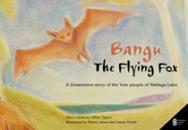 5239997692916499470.jpg
5239997692916499470.jpg
 Bangu the Flying Fox : A Dreamtime Story of the Yuin People of Wallaga Lake
single work
children's
Indigenous story
dreaming story
Bangu the Flying Fox : A Dreamtime Story of the Yuin People of Wallaga Lake
single work
children's
Indigenous story
dreaming story



